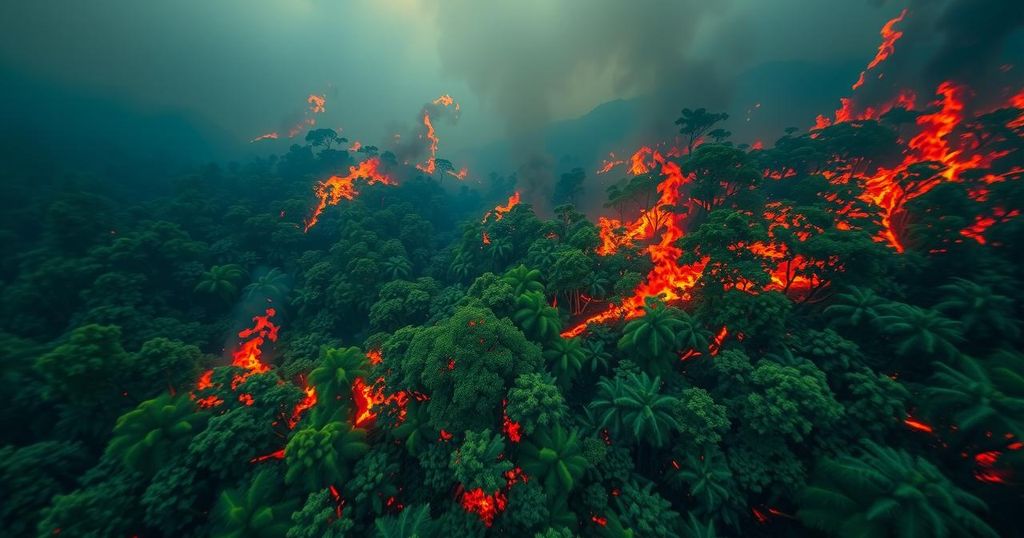A significant surge in wildfires has devastated an area of the Amazon rainforest equivalent to Switzerland, with an 846% increase from 2023, raising alarms among officials and researchers. Criminal entities may leverage the conditions created by climate change to engage in illegal activities, particularly in the Jamanxim National Forest. The Brazilian government is considering new policies for reforestation to tackle these issues while recognizing the implications of climate change on global ecology.
In Brazil, wildfires have devastated an area equivalent to the size of Switzerland, promoting alarm regarding the long-term repercussions on the Amazon rainforest. A recent satellite assessment revealed that from January to mid-October 2024, the area affected by fires grew by an astonishing 846% compared to the same period in 2023, surpassing the desolation witnessed in 2019 during the administration of former President Jair Bolsonaro. The National Institute for Space Research, which monitors official deforestation rates in Brazil, contributes to these disturbing findings, indicating that the drought exacerbated by climate change may be exploited by criminal actors seeking to convert forest land into agricultural pasture without going through the conventional means of logging. Ane Alencar, the science director at the Amazon Environmental Research Institute, remarked on the data: “The data is exceptionally alarming, it’s a very abrupt surge.” Furthermore, André Lima, secretary for deforestation control at the Ministry of the Environment and Climate Change, noted the concerning ease with which a relatively small number of individuals can start large-scale fires: “You don’t need 1 million people setting fires to cause the disaster. One thousand can do it. We recorded 500 large blazes, that all began with a match.” In 2024, the already severe ecological crisis was compounded by a substantial increase in wildfires during September. By this time, nearly 1,900 square kilometers of the Jamanxim National Forest, a significant conservation area, suffered rapid destruction—a staggering 700% increase relative to the previous year. This particular trend is highly suggestive of unlawful ranching activities in regions where speculative land grabbing has escalated, especially near Novo Progresso—a notorious deforestation hotspot. The government of Brazil is contemplating mandatory reforestation of all burned areas to protect against further land encroachment by unauthorized ranchers. Simultaneously, climate authorities emphasize that the increase in fires represents a broader global phenomenon and contributes to worsening climate conditions. The findings depict that while the deforestation rate may be declining under President Luiz Inácio Lula da Silva’s administration, the ecological damage is profound and poses a dire threat to the future integrity of the Amazon rainforest.
The Amazon rainforest is significant for its biodiversity and role in the global climate system, but it faces increased threats due to climate change and human activities such as deforestation and illegal land grabbing. The rise in wildfires is alarming, particularly in light of a two-year drought exacerbated by climate change and the El Nino phenomenon, which has led to substantial ecological degradation and biodiversity loss. Criminal organizations may now be leveraging the economic opportunities presented by the adverse climatic conditions to undertake illegal activities, raising urgent concerns for environmental protection efforts and policy responses.
The ongoing destruction of the Amazon due to rampant wildfires not only highlights the severe impacts of climate change but also reveals a troubling trend whereby criminals exploit environmental conditions for personal gain. The Brazilian government’s potential implementation of reforestation laws serves as a critical measure to combat the crisis, yet underlying data underscores the urgency for comprehensive policy reform to address the dire trajectory of deforestation and preserve the invaluable Amazon rainforest for future generations.
Original Source: apnews.com






